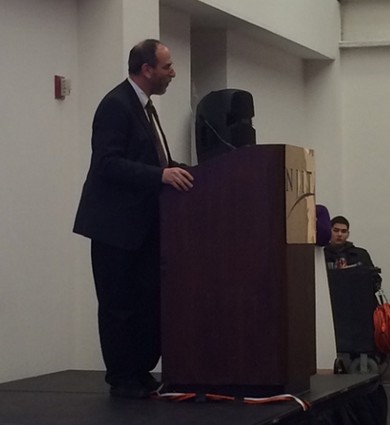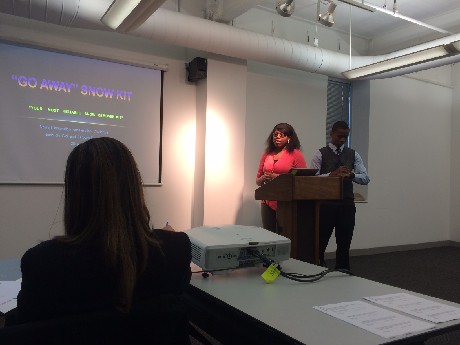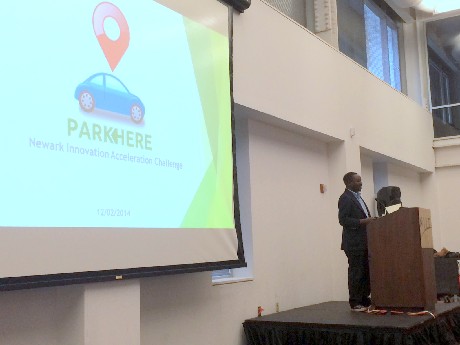NJIT Innovation Acceleration Challenge Gives Head Start to New Entrepreneurs

New Jersey Institute of Technology held its sixth annual Newark Innovation Acceleration Challenge on Dec. 2, 2014.
These pitch events, sponsored by Capital One Bank, Greater Newark Enterprises Corporation. and Sterling Medical Devices, are always exciting, with students striving to convince the judges of the merits of their ideas. Entrepreneurs from the Newark area are also invited to compete.
Only two of the winning pitches on Dec. 2 were in the digital tech category, one in the student track and one in the community track (for local entrepreneurs). As it happened, a winner of the community track was Park Here, a company that had won Lean Startup Newark.
The sponsors provided cash prizes for the winners: Innovation Acceleration Fellowships, which include $3,000 in seed funding, as well as participation in the 10-week Lean Innovation Accelerator Program this summer, and one-on-one consulting time with GNEC, Capital One, and Rising Tide Capital.
The competitors were welcomed by Reggie J. Caudill, the interim dean of the New Jersey Institute of Technology’s School of Management, who told them, “The digital economy is creating unparalleled competition for everyone and everything around the globe, but it has also created something else: opportunities. It has created new opportunities to develop new services and products and innovations.”
Companies and students are challenged to take a good idea and shape it into a great idea. “But you are not there yet. You may have a great idea, but your customer has to see value.”
Joel S. Bloom, NJIT president, also addressed the audience, saying that innovation can be a very long process that takes a massive amount of research, intelligence and funding. But most of all, he said, you have to keep the beneficiary of that innovation in mind.
Speaking to the competitors, Bloom noted that some of the best ideas are the simplest ones, as they provide the highest return on investment to the innovator. Echoing Caudill’s thoughts, he added, “You really don’t need to spend a lot of time on innovation. You should spend more time looking around and listening, looking for needs.” The key is figuring out what will help someone do something more quickly and inexpensively.
The student track winners were:
Neel Belani – NSB Care Management – A software tool that will enable hospitals to identify high-risk patients by automatically reviewing electronic health records. This will allow hospitals to reduce 30-day readmissions, save money, and improve healthcare outcomes.
Chrystoff Camacho – Verti Grow – In urban communities, vertical farming will create new opportunities to bring healthy, organic, locally grown produce to people with inadequate access to nutritious food.
Bo Zhang – Bimodal Cough Simulator – Infectious diseases such as Ebola, influenza, and SARS have become a serious public health problem worldwide. This system will simulate virus transmission, making it possible to remediate and improve the health and safety of our working and living environments.

Nnebuchi Weli – Go Away Snow – When snow blankets our vehicles, removal is necessary before motorists can drive safely. This kit will make snow removal easy, and will reduce health hazards such as frostbite, back pain, and injury from slips or falls.
The community track winners were:
K.L. Pickett – Qwik Switch Air Filters – This robust alternative to existing air filters will improve indoor air quality by removing dust, pollen, pet dander, bacteria, mold spores, and other particulates from homes and businesses that use HVAC or forced hot air systems.
D’TaRelle Tullis – Pitter Patter Feet – Utilizing six dance disciplines, the martial arts and yoga, this program helps prevent childhood obesity and helps children to learn more quickly and easily.

Nathan Kwadade – Park Here – Research suggests that 30% of traffic congestion is caused by drivers searching for parking. This application will connect drivers with home and business owners offering spare parking spaces.
Tara Williams – Caring for Children – Urban environments offer few opportunities for families and children to participate in quality affordable after-school programs. This company will expose students from the greater Newark area to STEM-related classes and activities.
The New Jersey Innovation Acceleration Center advisory board did a lot of the behind-the-scenes preparatory work for the event, according to Michael Ehrlich, associate professor at NJIT’s School of Management and codirector of the NJIAC.
Judges who screened the applicants included bankers from Capital One who specialize in small business finance.
For the final competition, the judges for the community track were: Theresa Bedeau , Capital One; Kumari Ghafoor-Davis, Coach Kumari; Darrell W. Gunter, Gunter Media Group; Sharon Levy, Taking Tea in Style; and Mark Charbonneau, Capital One.
The student track judges included Dan Sterling, Sterling Medical Devices; Daisy Rivera-Muzzio, Acumen Biopharma; Colin Crosby, M.E.R.I.T.; Luke Chilone, TD Ameritrade; and Pasquale (Pat) Granieri, Capital One.

